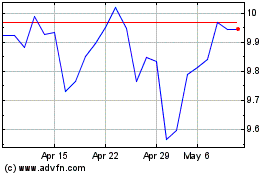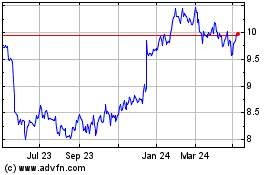Actor Harry Shearer Sues Over 'Spinal Tap' Royalties
October 18 2016 - 6:10PM
Dow Jones News
Comedian and actor Harry Shearer said in a lawsuit filed Monday
that he's been bilked for years out of profits generated by "This
Is Spinal Tap," the classic comedy film he starred in and helped
create. He's seeking damages that go way beyond 11.
Mr. Shearer, suing through his production company, is seeking
$125 million in compensatory and punitive damages from Vivendi SA,
the French conglomerate that controls the film's rights, and its
StudioCanal subsidiary. The suit was filed in federal court in Los
Angeles.
The suit alleges Vivendi and its subsidiaries, through
manipulative accounting and negligent control of its "Spinal Tap"
copyrights, deprived Mr. Shearer of millions of dollars generated
by the movie's long afterlife. He is also seeking control of the
trademarks to the band name Spinal Tap and Derek Smalls, the
character he portrayed.
A spokesman for Vivendi declined to comment.
The concert mockumentary about an over-the-hill metal band was
well received when it was released in 1984, and it has since
enjoyed a steady stream of revenue that's relatively rare in
Hollywood. Video and television deals have followed, along with
merchandise celebrating the movie's catchphrases, including
fictional guitarist Nigel Tufnel's explanation that the dials on an
extra-loud amplifier "go to 11," rather than the usual 10.
Mr. Shearer, who would go on from "Spinal Tap" to a comedy
career that includes voicing 23 characters on "The Simpsons," says
in the suit that, despite the movie's cult status, he and the
movie's co-creators received $81 in merchandising income and $98 in
sales for songs featured in the movie like "Sex Farm" and
"Stonehenge" between 1984 and 2006. No financial statements were
provided for the last two years, the suit alleges.
Suits like Mr. Shearer's occasionally appear in Hollywood, where
disputes over studio accounting are commonplace. It's rare to see a
suit related to a movie like "Spinal Tap," which is selling
merchandise and generating deals more than 30 years after its
release.
"Spinal Tap" had a modest budget of $2.25 million, and was
inspired by a fictional band created by Mr. Shearer, Christopher
Guest and Michael McKean. The three men have continued to work
together in the years since, most notably for Mr. Guest's other
mockumentaries like "A Mighty Wind." Messrs. Guest and McKean are
cited as co-creators of the act but are not named as plaintiffs in
the suit.
"This Is Spinal Tap" made $4.5 million during its initial
theatrical release. The rights to the film then changed hands
several times before landing with Vivendi. Mr. Shearer's suit
alleges that his original distribution agreement included
profit-participation deals on sales related to the movie.
Vivendi, the suit alleges, has failed to collect potential
royalties on merchandise sales by abandoning "Spinal Tap"
trademarks and forfeited potential money by not going after
trademark breaches (the suit cites a brewing company that
successfully filed for a "Spinal Tap"-inspired beer).
Mr. Shearer is hoping to tap his movie's massive fan base for
support in the suit. In a video posted to his Twitter account on
Tuesday, he ran through the movie's distribution over the
decades—from theaters to home video.
"And yet, for most of that time, according to Vivendi, it hasn't
been profitable," he said.
Mr. Shearer said the suit was part of a larger effort needed to
get artists their share. "Going up against a major multinational is
not nearly as enjoyable as playing too loud in Carnegie Hall," he
said, referring to a gig on the fictional band's 2001 reunion
tour.
Write to Erich Schwartzel at erich.schwartzel@wsj.com
(END) Dow Jones Newswires
October 18, 2016 17:55 ET (21:55 GMT)
Copyright (c) 2016 Dow Jones & Company, Inc.
Vivendi (EU:VIV)
Historical Stock Chart
From Mar 2024 to Apr 2024

Vivendi (EU:VIV)
Historical Stock Chart
From Apr 2023 to Apr 2024
